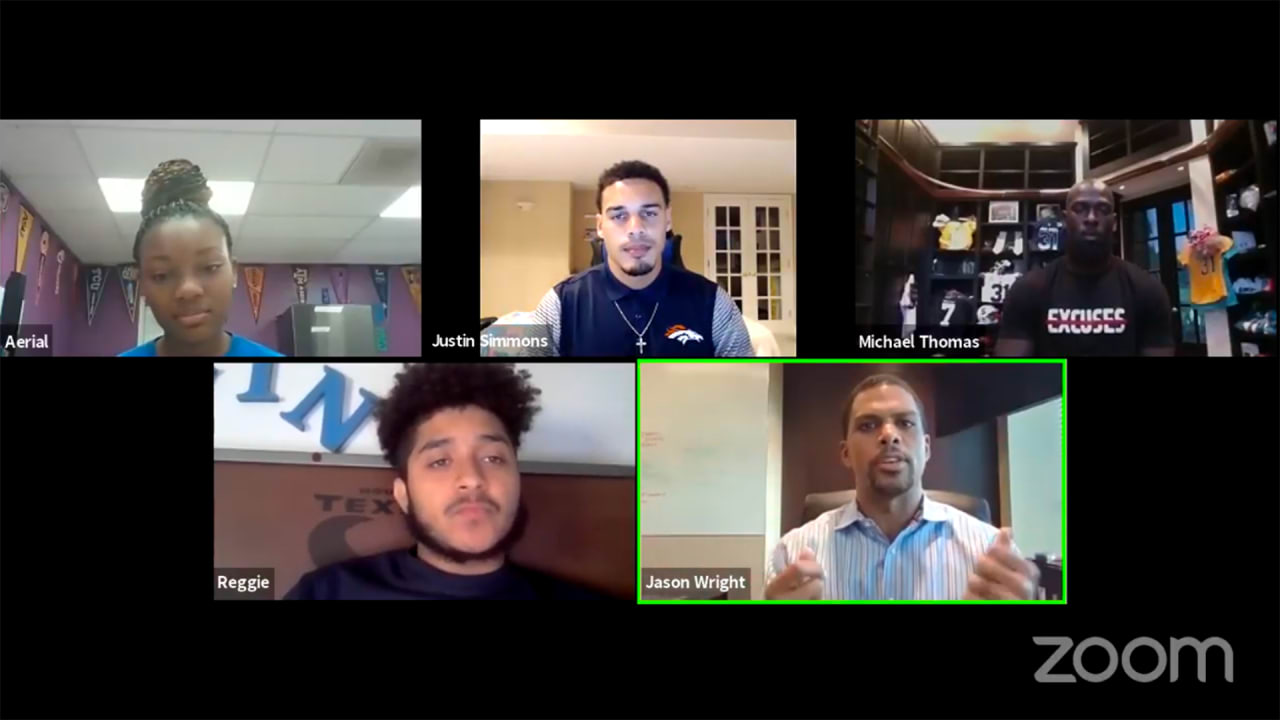Miles
Well-known member
- Mar 18, 2019
- 2,455
- 0

And, as Simmons hoped, it helped today's leaders in Simmons, Thomas and Wright to reach the next generation of change-makers.
"It's tremendously important," Simmons said following the panel discussion. "I mentioned [during the town hall], it's always a great time to stand up and speak up about social injustices that are happening. [Reggie] went to the point of saying, 'I feel like my voice, or our voices, in certain communities … [that] it doesn't matter what I say.' But that's what myself, Jason and Michael Thomas were talking about, [saying] 'Your voices are louder than you think. Obviously when you grow old enough to be able to vote and you grow old enough to be able to do this, that and the other, but even now as teenagers, educating yourself on certain things that are going on, like laws being passed, certain situations even as simple as 'What's typical protocol when you get pulled over for a speeding ticket or running a red light,' or 'What are things cops can't do,' really educating yourself.
"… Those are the things that we were kind of harping on, like even as a younger generation, there are a lot of things that you can do that can help empower you to think critically about how you want to shape the future, and we were harping on it, man. Our communities have more impact and more power than they think, than they give themselves credit for."
Wright called Reggie and Aerial and their peers "a critical generation" in the United States' evolution, and Simmons reached more young members of the community later Tuesday as he joined members of the Denver Broncos Boys & Girls Club for a RISE leadership session.
Earlier this month, the Denver Broncos launched a multi-week teen program at the Denver Broncos Boys & Girls Club in partnership with RISE, a national nonprofit designed to educate and empower the sports community in issues of racial inequities. Simmons has joined young Colorado residents for the virtual leadership program for each of the first three sessions and plans to attend for the final five hour-long discussions.
On Tuesday, the RISE program focused on implicit biases and how they impact our daily lives. Simmons participated in a discussion with more than a dozen members of the Boys & Girls Club, and he explained afterward that this sort of training is what he believes the country needs to move forward.
During the Youth for Change Town Hall, Reggie spoke passionately about how he worries for his safety and life in certain situations, simply because of the color of his skin. Simmons pointed toward the RISE training as a method to begin to counter these realities and help a larger segment of the population empathize with fears of young Black men and women.
"We need to break these biases and implicit biases of how we perceive people, because everyone's situation is different," Simmons said afterward. "You think about, if only we could have these conversations and people could really get to know someone the way that they view life through a different lens. Obviously, those, I feel like a lot times those barriers would be broken down."
The 26-year-old safety, though, knows progress may not happen immediately.
"It's not like it's going to happen with the snap of a finger," Simmons said. "These things take time. These protests that are happening now are for the same exact reasons they happened 10, 20, 30, 40 years ago, and we see now in the protests today that there are a lot more people from different backgrounds — racial, ethnic backgrounds — that are joining protests for Black Lives Matter or for minorities than there were back when they were doing these protests in Martin Luther King days. You can see the growth happening, but it would definitely speed up the process if people would just, like we talked about tonight, really broke their biases or implicit biases of how they view other people due to race or ethnicity."
Simmons knows that being vocal about issues of social justice and police reform may make him a controversial figure among segments of the population. Thomas spoke at length about how he believed his decision to kneel initially in solidarity with Colin Kaepernick impacted his career trajectory. As with any issue, it's easier to be silent rather than speak up. Simmons, though, understands the fight for equality is "bigger than me."
That's why, even as the Broncos face a pivotal game against Kansas City to improve to 3-3, Simmons and his teammates remain as focused on effecting change as they were in May, June, July and August.
"I've come to realize now that I have a tremendous and amazing platform to be able to help so many people around the country, especially our youth, to have a better future," Simmons said during the panel. "It's not about me. It's not about what I've already done or what I've already gone through but what I can do to help our younger generation to break this life-long, 400-plus year [cycle] of systemic racism and things of that nature that have oppressed so many people before me.
"That's the biggest reason why I'm so big on [advocating for] social justice, is to really break that mold, because we're in an amazing position to do so."
